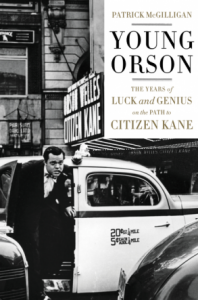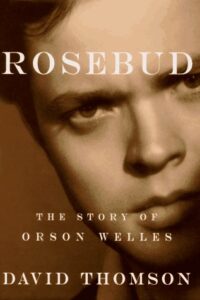A footnote to the following (February 7, 2018): I now regard Patrick McGilligan’s Young Orson: The Years of Luck and Genius on the Path to Citizen Kane as the best of all the Welles biographies to date — and at the very least, the most thoroughly researched. — J.R.
Film Benjamin Schwarz on David Thomson: A defense of Orson Welles
Posted By Jonathan Rosenbaum on 01.12.07 at 03:30 PM
I sent the following letter to the Atlantic last August. I’m not surprised it wasn’t published. But I can’t resist reproducing it now that Benjamin Schwarz, the magazine’s literary editor and national editor, has shown further signs of his David Thomson idolotry while writing about Cary Grant in the current issue. This time Schwarz calls Thomson’s A Biographical Dictionary of Film, now in its fourth edition, the “finest reference book on the movies.” (He also offers some other debatable critical judgments, such as calling Sylvia Scarlett “a mess of a picture” rather than an exciting forerunner of the French New Wave in its daring mix of genres.) But before getting to his assertion about Thomson’s book, let me reproduce my letter:
“It seems sadly characteristic of the mainstream reviewing of film books in general and those about Orson Welles in particular that nonspecialists routinely take precedence over specialists — and that biographers who forgo original research for the sake of speculation or invention, and even admit to doing this, can be deemed superior to actual scholars, at least if their biases match those of the reviewers.
“I assume it’s on this basis that Benjamin Schwarz, in the course of reviewing Simon Callow’s Orson Welles: Volume II: Hello Americans, can deem David Thomson’s Rosebud —- a book that to my knowledge isn’t taken even halfway seriously by any Welles scholar including Callow (who doesn’t mention it once in the combined 1,147 pages of this book and its predecessor, The Road to Xanadu) — ‘the most astute assessment of Welles’s work and personality.’
“As a Welles scholar and critic, and the editor of This is Orson Welles (which Schwarz calls both ‘penetrating’ and ‘tendentious’), I can’t claim to be disinterested. But I’m not asking for Thomson or Schwarz to convert to being simple fans or apologists. It’s legitimate to criticize Welles if the criticism is based on something other than mythology or mere hunches. So it seems reasonable to ask for some clarification about where Schwarz’s judgments are coming from.
“My own conviction is that Welles’s life, working methods, career, and work have all created ideological disturbances that continue to resonate in our culture, and that it’s the job of writers like Thomson to settle such disturbances with satisfying (‘astute’?) ways of characterizing Welles. So I’d like to better understand the basis for Schwarz’s judgment.
“To be fair, Schwarz also calls Rosebud ‘uneven,’ ‘idiosyncratic,’ and ‘superbly written,’ none of which I’m quarreling with. But what does he mean, exactly, by Welles’s ‘work’ and ‘personality’ — or by his assumption that he and Thomson are qualified to arrive at meaningful conclusions about them? Substantial portions of what I consider Welles’s major work remain difficult or impossible for most people to see — including not just Chimes at Midnight but also Don Quixote and The Other Side of the Wind, not to mention such earlier works as The Fountain of Youth, Othello (with Welles’s original sound track), and Filming Othello. Thomson not only hasn’t seen Don Quixote or The Other Side of the Wind (which is perfectly excusable); he’s explicitly stated that he has no desire to —- and he shows no interest or even awareness about Othello’s separate versions. Filming Othello (mistitled The Making of Othello in Rosebud) receives a passing slam but no description or analysis, while The Fountain of Youth, a 50s TV pilot, is similarly dismissed as inconsequential without even a reference to its innovative style and method of storytelling. Are these the sort of assessments that Schwarz believes that other writers about Welles should be emulating? If so, why?
“As for Thomson’s treatment of Welles’s personality, he never met the man. Yet this doesn’t prevent him from arriving at conclusions about, for instance, Welles’s class and racial biases, backed up by nothing but wild suppositions and flatly contradicted by the statements of many people who actually knew Welles. What lessons, according to Schwarz, should these people be taking from Thomson about such matters?”
“Yours sincerely,
“Jonathan Rosenbaum”
Now, an addendum on the subject of A Biographical Dictionary of Film: rather than focus on its omissions and denials, which I’ve already done elsewhere, I’d like to raise my eyebrows at the notion that the book, whatever its merits as criticism, is any kind of reference book at all. Apart from skeletal and often incomplete or faulty filmographies, its facts are few and far between.
Tags: Orson Welles, The Atlantic, David Thomson, A Biographical Dictionary of Film, Benjamin Schwarz, Image
Showing 1-19 of 19
Posted by Petey W. Straw on 07/26/2009 at 6:45 PM


